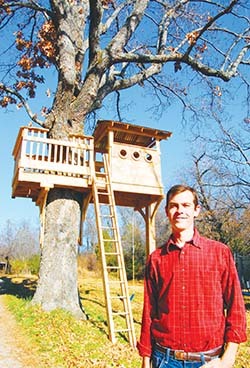Natural State Treehouses Expands Carpentry Market
by December 9, 2013 12:00 am 195 views

Natural State Treehouses owner and craftsman Josh Hart says woodworking is in his blood. Although his father was a school teacher by trade, his life’s work is carpentry.
Growing up, Hart spent many hours watching his father build things, often helping and always soaking in the know-how his father shared, gained from decades of practicing his craft. He’s had no formal training, but Hart spent years cultivating his natural talent for woodworking.
As an adult, he decided to turn his passion into a career. It started with a desire to build a tree house for his own children, but he soon realized his carpentry and design skills were a commodity that, coupled with his years of customer service experience working at the Walton Arts Center and his love for art might all add up to a viable company. “It just clicked,” he said. He enlisted the help of several like-minded craftsmen, and Hart and his wife Kate started Natural State Treehouses.
That was two and a half years ago, and Hart says he hasn’t had a week off since. “It took off immediately.” The company was profitable within six months and has doubled its income each year for the first three years.
And now, Natural State Treehouses is branching out.
The company is taking on several new skilled workers in specialized fields and is adding custom furnishings and cabinetry to its repertoire.
In the past, the team concentrated on tree houses but occasionally worked on other outdoor projects, such as decks and fences. However, now it is expanding indoors, and making the general carpentry aspect of the business official, creating a new entity called Natural State Carpentry.
The team’s work seems to speak for itself. Hart has achieved success with very little marketing. His business has been almost completely word-of-mouth.
Perhaps the most unique element of Hart’s business model is fixed pricing. Instead of offering an estimate, he gives the price of any given project upfront.
Hart said he is confident in his pricing and believes if something unexpected comes up, it is the company’s responsibility to take care of it.
“We’re good enough and experienced enough to be right-on most of the time,” he said.
He plans to maintain this philosophy moving forward. While the business is growing, Hart aims to “keep it small” in a way.
For each tree house project, after consulting with the client and designing, the team provides the customer with a 3-D model, in addition to a drawing of the project.
Hart then drives to a sawmill in northeast Arkansas and selects every board that will be used to construct the tree house. He does not do this for each general carpentry project, but always utilizes quality, local oak and cypress wood.
Sustainability is paramount for Hart and his team. There is virtually no waste, he said. When there are design bi-products, the team uses them by making, for example, toy blocks for children. In the past, they have given these toys away, but Hart said there might be potential down the road to sell them.
Hart has often built outdoor spaces for adults. Also, when building children’s tree houses, he strives to create designs that can take on another purpose after children no longer use it. For example, he once created a playhouse that transitioned into a garden shed.
Hart said Natural State Treehouses and Natural State Carpentry are able to offer top-quality work because of the cooperative model by which they operate.
This is not a crew of employees. It’s a group of artisans, all with their own strengths and expertise. Hart said this method insures the customer gets the best-of-the-best for any given job. The team always sticks to the timeline, almost always completing projects earlier than promised.
